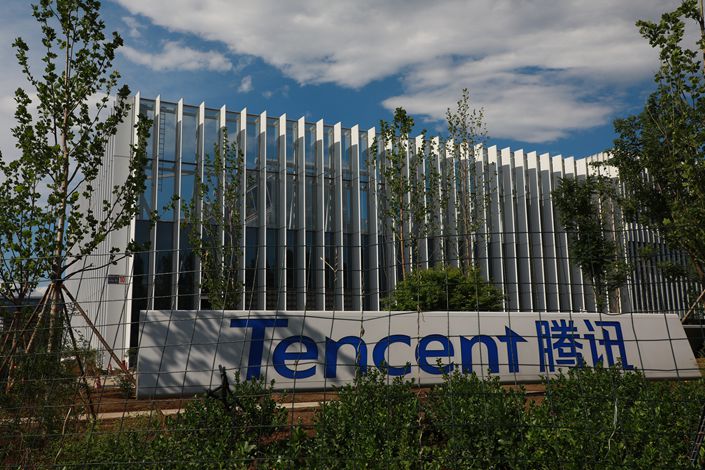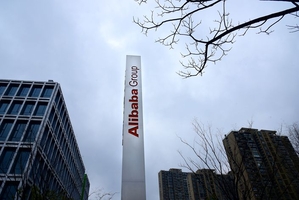China Hits More Internet Businesses With Antitrust Fines

China’s market regulator slapped more fines on 11 companies for violating the Anti-Monopoly Law by failing to obtain advance regulatory permission for past acquisitions or joint-venture deals.
The penalties continue a crackdown as authorities seek to rein in China’s freewheeling internet industry. Regulators imposed a record fine earlier this month on Alibaba Group Holding Ltd. related to “picking-sides” tactics and penalized 13 companies last month for failing to seek antitrust clearance for internet-related investments and acquisitions. The moves signal that regulators are through turning a blind eye to the kind of deal-making that helped the likes of Alibaba and Tencent Holdings Inc. become internet titans.
Tencent was fined 500,000 yuan ($77,200) for violations in two cases, the State Administration of Market Regulation (SAMR) said Friday in a statement. The fine involved Tencent’s acquisitions of a stake in Bitauto Holdings Ltd., a New York-listed online automotive advertising service provider, and a stake in Shanghai Lantu Information Technology Co. Ltd., which operates the automobile maintenance platform Tuhu.
Separately, Tencent’s investment arm registered in Tibet was fined 500,000 yuan for not seeking regulatory approval for its 2018 investment in Dalian Wanda Group’s commercial property unit.
In March, Tencent was fined 500,000 yuan for a 1.65 billion yuan investment in online tutoring platform Yuanfudao in 2018. The SAMR determined that the transactions themselves weren’t anti-competitive.
In December, the SAMR said it was reviewing a proposed multibillion-dollar acquisition of game-streaming site DouYu International Holdings Ltd. by rival Huya Inc. The merger of Huya and Douyu, both backed by Tencent, would give Tencent a 67.5% stake in the new company. The regulator has yet to disclose the result of the investigation.
Alibaba’s health data unit Hongyun Jiukang Data Technology (Beijing) Co. Ltd. and Alibaba-backed Ant Group’s unit Shanghai Yunxin Venture Capital Management Co., Ltd. were also each fined 500,000 yuan for setting up their joint venture in 2018.
Other companies hit by the latest penalties include:
• Shanghai Han Tao Information Consultation Co. Ltd., a unit of Meituan Dianping and operator of China’s largest restaurant review site Dianping.com, in relation to its 2018 investment in dental care supply chain platform Linkedcare.
• Didi Chuxing’s Jiaxing unit and Toyota Motor Corp. for their joint venture in 2019 and the Jiaxing unit’s 2018 investment in Yestock Car Rental
• Suning.com Co. Ltd.’s investment unit for its acquisition of a stake in Shanghai Yiguo E-commerce Co. Ltd. in 2016.
Even though 500,000 yuan is the maximum penalty under the current Anti-Monopoly Law, it is negligible punishment for deals worth billions of yuan. Coming revisions to the antitrust law are expected to increase the maximum fines for such violations to 10% of a company’s sales in the previous year.
As part of a sweeping crackdown on anti-competitive activities by China’s Big Tech companies,
the SAMR issued new guidelines for the “platform economy” Feb. 7 that bring several grey areas under its regulatory purview.
For the first time, the variable interest entity (VIE) structure — a legal structure that many Chinese tech companies use — is now formally covered by China’s Anti-Monopoly Law, according to the guidelines. Typically based in low-tax jurisdictions like the Cayman Islands, VIEs were often used by Alibaba, Tencent and others to raise funds in the U.S. and skirt Chinese laws barring foreigners from owning assets in certain sectors.
A large number of Chinese internet platforms, including food delivery, car hailing, online travel booking and online tutoring, are backed by Alibaba or Tencent, the country’s two internet titans. Most of these investments never faced antitrust scrutiny.
In the 13 years since the Anti-Monopoly Law was enacted, Tencent reported 785 investment deals and Alibaba 440, according to business record database Tianyancha.
Timmy Shen contributed to this report.
Contact reporter Denise Jia (huijuanjia@caixin.com) and editor Bob Simison (bobsimison@caixin.com)
Download our app to receive breaking news alerts and read the news on the go.
Follow the Chinese markets in real time with Caixin Global’s new stock database.

- PODCAST
- MOST POPULAR







 Sign in with Google
Sign in with Google
 Sign in with Facebook
Sign in with Facebook
 Sign in with 财新
Sign in with 财新